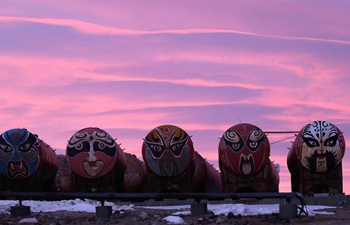ATHENS, Feb. 28 (Xinhua) -- Carnival revelers took over the center of Athens on Thursday, with musicians and dance groups performing in squares, markets and pedestrian streets around the Acropolis, duly keeping the ancient customs alive.
Dressed in traditional costumes from all over the country, folk dance groups performed in front of the Parliament and in other districts of the capital, urging passers-by to join in the celebration of Tsiknopempti (literally Smelly Thursday) and in general the festivities of the Greek carnival named Apokries.
On the Thursday of the second week of the Greek carnival, Greeks traditionally gather around the table to enjoy grilled meat dishes. "Pempti" means Thursday in Greek and "tsikna" means smoke from meat cooked on grill.
This carnival custom has its roots in ancient Greek festivals, when people would drink wine and dance in honor of the gods of Greek mythology, in particular Dionysus, the god of wine and fun, according to experts.
Apostolis Takis, a teacher with a master's degree in Greek cultural heritage, was among the revelers who danced the "gaitanaki" on Syntagma square on Thursday.
"Gaitanaki is a custom, a happening that was incorporated into the Athenian and Greek carnival. It was brought from Asia Minor, from the refugees of Asia Minor. Gaitani means knitted ribbon, a silk ribbon," he told Xinhua.
Dancing around a wooden pole, each member of the group is holding a ribbon. By the time the music stops, a colorful braid has been created.
According to experts, the dance symbolizes the circle of life, the passage from winter to spring.
During the carnival, the municipality of Athens organizes dozens of events for its citizens and foreign visitors.
"15 days to Clean Monday, 65 events with free entrance for all. We want you close to us and we are expecting you," Rania Mallianou, head of the department of cultural events of the Culture, Sports and Youth Organization of the City of Athens, told Xinhua at Syntagma square.
The festival season in Greece will culminate on March 11 with the celebration of Clean Monday with more singing, dancing and kite flying. Clean Monday marks the end of the carnival and the start of the 40 days of Lent to Easter for Greek Orthodox Christians.













